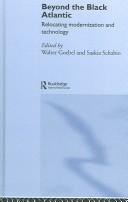| Listing 1 - 3 of 3 |
Sort by
|

ISBN: 9780415397971 9780415397988 0203969723 9780203969724 0415397987 0415397979 9781134151547 9781134151585 9781134151592 Year: 2006 Publisher: London Routledge
Abstract | Keywords | Export | Availability | Bookmark
 Loading...
Loading...Choose an application
- Reference Manager
- EndNote
- RefWorks (Direct export to RefWorks)
Debates about the 'Black Atlantic' have alerted us to an experience of modernization that diverges from the dominant Western narratives of globalization and technological progress. This outstanding volume expands the concept of the Black Atlantic by reaching beyond the usual African-American focus of the field, presenting fresh perspectives on postcolonial experiences of technology and modernization. A team of renowned contributors come together in this volume in order to: * redefine and expand ideas of Black Atlantic * challenge unified concepts of modernization from a postcolonial perspective * question fashionable concepts of the transnational by returning to the local and the national * offer new approaches to cross-cultural mechanisms of exchange * explore utopian uses of technology in the postcolonial sphere. Exploring a variety of national, diasporan and transnational counternarratives to Western modernization, Beyond the Black Atlantic makes a valuable contribution to the fields of postcolonial, literary and cultural studies.
Comparative literature --- Thematology --- anno 1900-1999 --- Globalization in literature. --- Literature, Modern --- Postcolonialism in literature. --- Technology and civilization. --- Technology in literature. --- Black authors --- History and criticism. --- Minority authors --- TECHNOLOGIE DANS LA LITTERATURE --- GLOBALISATION DANS LA LITTERATURE --- Postcolonialisme --- LITTERATURE MODERNE --- Dans la littérature --- AUTEURS NOIRS --- HISTOIRE ET CRITIQUE
Book
ISBN: 9783884769355 Year: 2007 Publisher: Trier : Wissenschaftlicher Verlag,
Abstract | Keywords | Export | Availability | Bookmark
 Loading...
Loading...Choose an application
- Reference Manager
- EndNote
- RefWorks (Direct export to RefWorks)
In the last few years, the postcolonial world has been mapped with the help of economic, social, political and linguistic methodologies, which have helped us to understand how mechanisms of subjection and resistance play out in imperialist, neo-imperialist and globalizing contexts and how cultural norms and sign systems are translated in the process. There is, however, also an 'inside' story to intercultural contact, a story concerning the psychological and the affective dimensions, which shows up in collections of letters, in autobiographies, in novels and plays. This story has traditionally been mapped onto binary oppositions of containment vs. lack of restraint, of mind vs. body, which have led to stereotypical projections, for example of the noble savage, of the cannibal, of Western returns to savagery (Heart of Darkness) or of afrocentric concepts of the 'sun people' vs. the 'ice people'. While acknowledging this history of the mapping of the passions and emotions, the essays in this volume attempt to move beyond traditional oppositional images and to anticipate more intricate - though generally not yet symmetrical - forms of intercultural exchange, which result when affections - along with the disaffections they quite often inspire - are translated. The main focus of this collection of essays is on an extended version of the Black Atlantic and thus follows up some themes from our former volume Beyond the Black Atlantic (London: Routledge, 2006). Questions of silencing, alienation and stereotyping are raised in many of the contributions (Benjamin-Labarthe, Kossew, Msiska), paired with more optimistic appraisals of emotional exchanges and strategies of self-assertion (Ashcroft, Ahrens, Schabio). This volume was inspired by a number of conferences in the field of postcolonial studies which were held at the University of Stuttgart.
Postcolonialisme --- Globalisation --- Littérature anglophone --- Dans la littérature
Book
ISBN: 9780415539609 Year: 2013 Publisher: New York London : Routledge,
Abstract | Keywords | Export | Availability | Bookmark
 Loading...
Loading...Choose an application
- Reference Manager
- EndNote
- RefWorks (Direct export to RefWorks)
This volume explores how postcolonial texts have determined the evolution or emergence of specific formal innovations in narrative genres. While the prominence of questions of cultural identity in postcolonial studies has prevented due attention to concerns of literary form and aesthetics, this book gives premium to the literary, aiming to delineate the evolution of specific narrative techniques as part of an emerging postcolonial aesthetics. Essays delineate elements of an emergent postcolonial narratology across a variety of seminal generic forms, such as the epic, the novel, the short story, the autobiography, and the folk tale, focusing on genre as a powerful tool for the historicizing of literature and orature within cultural discourses. Investigating the heuristic value of concepts such as mimicry, writing back, translation, negotiation, or subversion, the book considers the value of explanatory paradigms for postcolonial generic models. It also explores the status of postcolonial comparative aesthetics versus globalization studies and liberal concepts of the transnational, taking issue with the prominence of Western concepts of identity in discussions of postcolonial literature and the favoring of mimetic forms. This volume offers a unique contribution to the study of narrative genre in postcolonial literatures and provides valuable insight into the field of postcolonial studies on the whole.
| Listing 1 - 3 of 3 |
Sort by
|

 Search
Search Feedback
Feedback About UniCat
About UniCat  Help
Help News
News